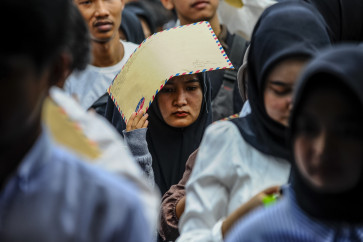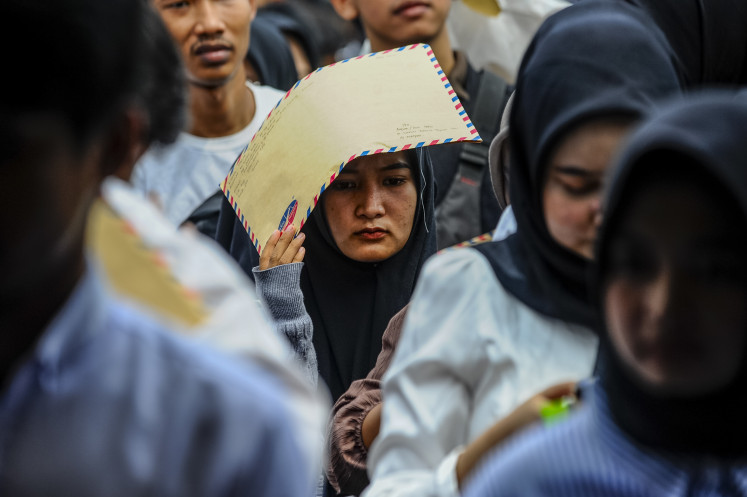Iran publicly executes second man convicted for protests
Latest execution came despite outrage after carrying out first last week.
Change text size
Gift Premium Articles
to Anyone

I
ran on Monday executed a second man convicted in connection with protests that have shaken the regime for almost three months, defying an international outcry over its use of capital punishment against those involved in the movement.
Majidreza Rahnavard had been sentenced to death by a court in the city of Mashhad for killing two members of the security forces with a knife, and wounding four other people, the judiciary's Mizan Online news agency reported.
It said he was hanged in public in the city, rather than inside prison.
The execution came despite global outrage after Iran on Thursday carried out the first execution linked to the protests. Mohsen Shekari, 23, was hanged after his conviction for wounding a member of the security forces.
Iran calls the protests "riots" and says they have been encouraged by its foreign foes.
Mizan published images of Rahnavard's execution, showing a man with hands tied behind his back hanging from a rope attached to a crane.
He was put to death after rights groups at the weekend warned that several other people arrested over the demonstrations were at imminent risk of being executed.
"The public execution of a young protester, 23 days after his arrest, is another serious crime committed by the Islamic Republic's leaders and a significant escalation of the level of violence against protesters," Oslo-based Iran Human Rights (IHR) director Mahmood Amiry-Moghaddam told AFP.
"Majidreza Rahnavard was sentenced to death based on coerced confessions, after a grossly unfair process and a show trial," he added.
The weeks of protest were sparked by the death in custody of Mahsa Amini, a Kurdish-Iranian arrested by the “morality police” for allegedly breaching the Islamic republic's strict dress code for women.
The protests represent the biggest challenge to the regime since the shah's ouster in 1979. They have been met with a crackdown that activists say aims to instill public fear.
New sanctions
Prior to the two executions Iran's judiciary said it had issued death sentences to 11 people in connection with the protests, but campaigners say around a dozen others face charges that could see them also receive the death penalty.
"No due process. Sham trials. That's how they want to stop the nationwide protests," said Omid Memarian, a senior Iran analyst at Democracy for the Arab World Now (DAWN) after the latest execution.
After Shekari was put to death, German Foreign Minister Annalena Baerbock said it showed a "boundless contempt for human life".
Washington called Shekari's execution "a grim escalation" and vowed to hold the Iranian regime to account for violence "against its own people."
The United Kingdom and Canada imposed additional sanctions on Iran after Shekari's execution.
But activists want the international reaction to go much further, starting with a recall of European Union ambassadors from Tehran.
"Majidreza Rahnavard's crime was protesting the murder of Mahsa Amini. The regime's method on dealing with protests is execution. EU recall your ambassadors," said US-based dissident Masih Alinejad.
Iran's use of the death penalty is part of a crackdown that IHR says has seen the security forces kill at least 458 people.
In early December Iran's top security body said more than 200 people had been killed since the protests erupted.
According to the UN, at least 14,000 have been arrested.
Iran is already the world's most prolific user of the death penalty after China, Amnesty International says.
'Risk of mass execution'
Public executions are highly unusual in the Islamic republic.
In July a man who had been convicted over the murder of a police officer in the southern city of Shiraz was hanged in public, marking what IHR said was the first such public execution in two years.
Amnesty said Saturday Iran was now "preparing to execute" Mahan Sadrat, 22, just a month after his "grossly unfair" trial. He was convicted of drawing a knife in the protests, an accusation he strongly denied in court.
Amnesty warned the life of another young man arrested over the protests, Sahand Nourmohammadzadeh, was also at risk "after a fast-tracked proceeding which did not resemble a trial".
He was sentenced to death in November on accusations of "tearing down highway railings and setting fire to rubbish cans and tires", the group said.
Amiry-Moghaddam warned of "a serious risk of mass execution of protesters" and urged a strong international "response that deters the Islamic Republic leaders from more executions."
Before the second execution was announced, Oscar-winning Iranian film director Asghar Farhadi on his Instagram account urged the authorities to halt the executions.
"Killing and executing defenseless young people and the oppressed will only bring you more anger and more hate," he said.









